2022届高考英语语法复习 定语从句 课件(29张ppt)
文档属性
| 名称 | 2022届高考英语语法复习 定语从句 课件(29张ppt) |  | |
| 格式 | pptx | ||
| 文件大小 | 383.4KB | ||
| 资源类型 | 教案 | ||
| 版本资源 | 通用版 | ||
| 科目 | 英语 | ||
| 更新时间 | 2021-10-31 18:55:35 | ||
图片预览

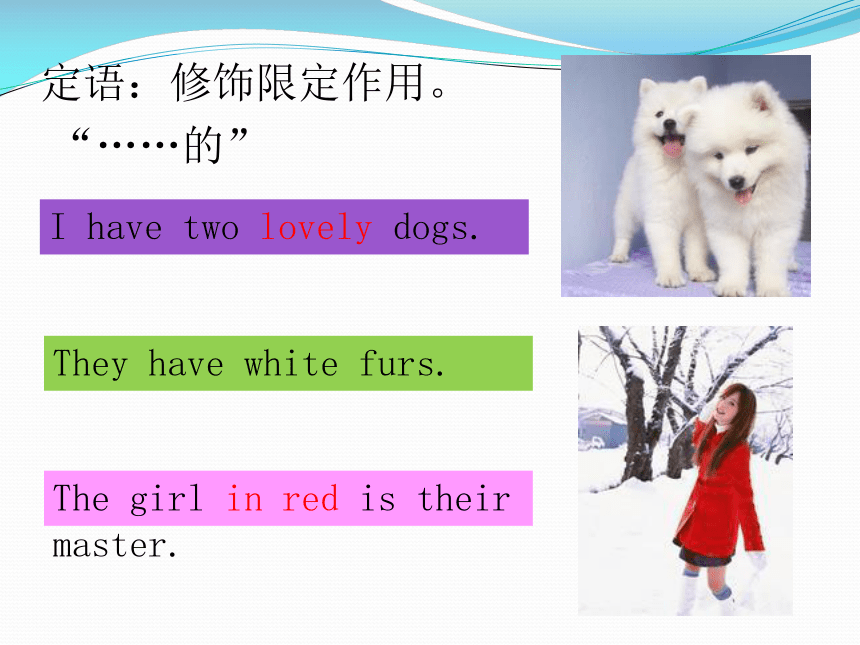
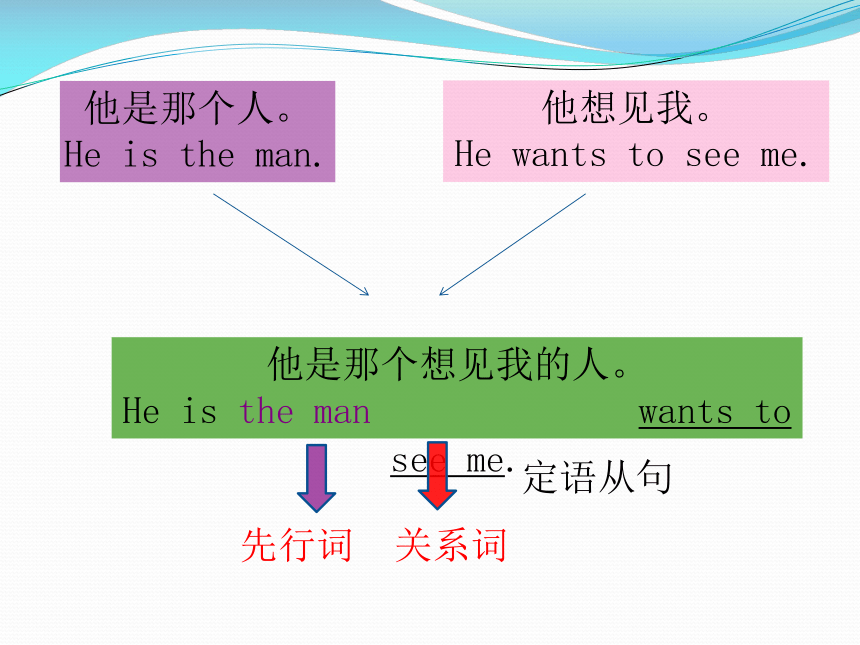
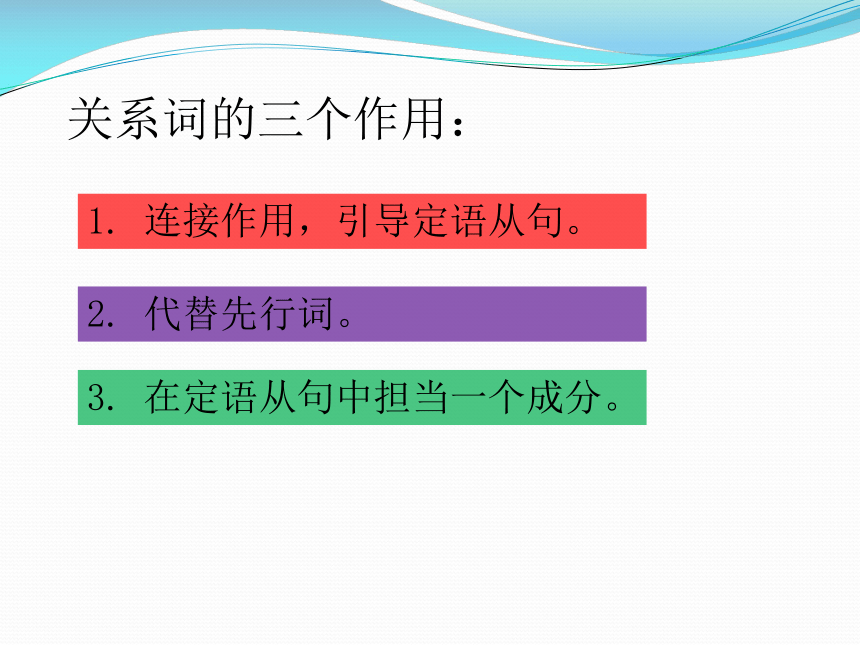
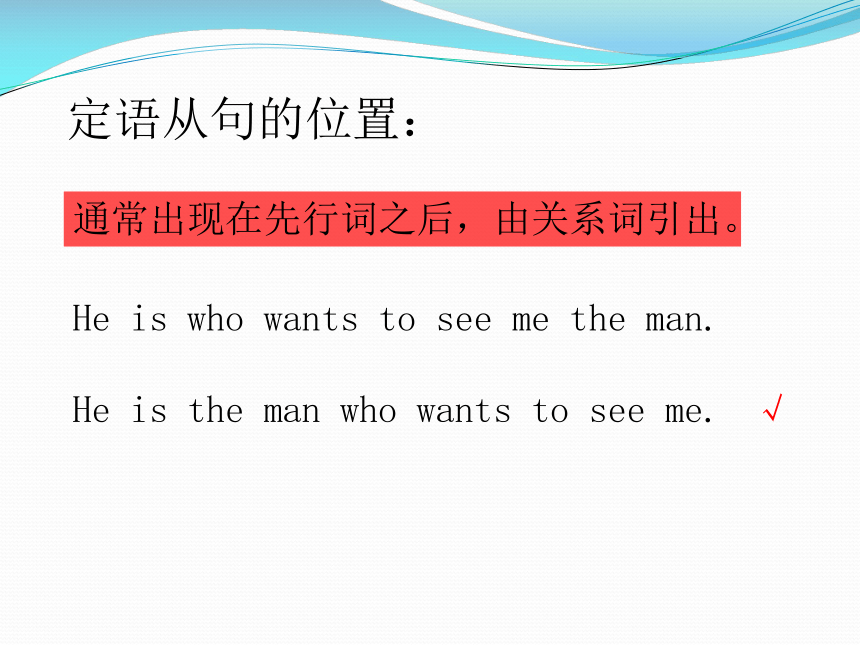
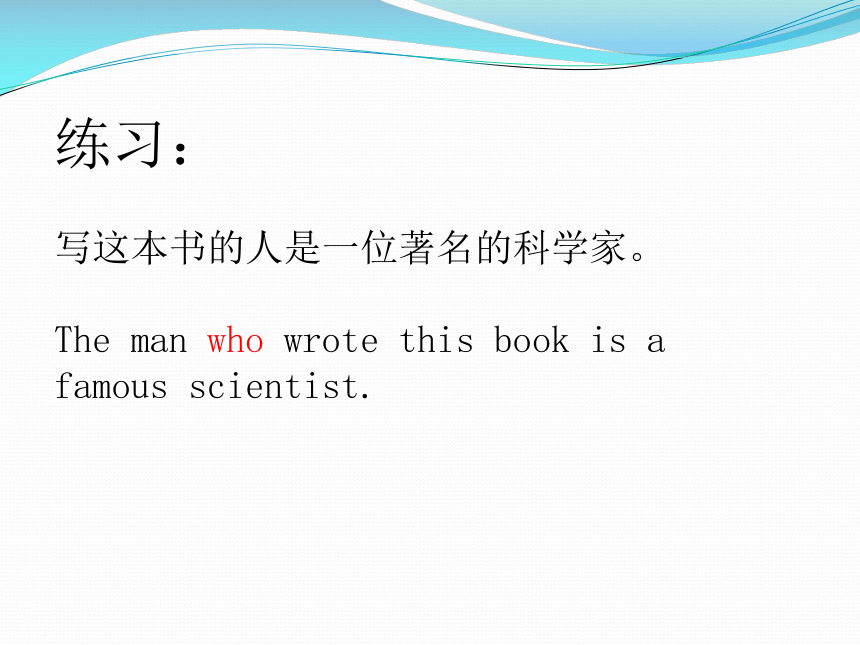
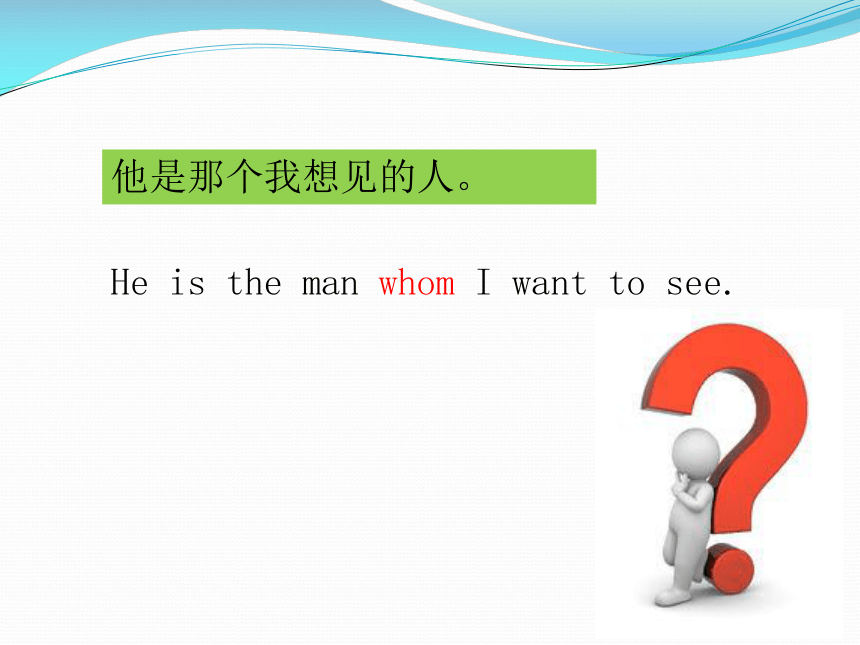


文档简介
(共29张PPT)
定语从句
Alina
They have white furs.
I have two lovely dogs.
The girl in red is their master.
定语:修饰限定作用。
“……的”
他是那个想见我的人。
He is the man wants to see me.
他是那个人。
He is the man.
他想见我。
He wants to see me.
定语从句
先行词
关系词
关系词的三个作用:
1. 连接作用,引导定语从句。
2. 代替先行词。
3. 在定语从句中担当一个成分。
定语从句的位置:
通常出现在先行词之后,由关系词引出。
He is who wants to see me the man.
He is the man who wants to see me.
√
练习:
写这本书的人是一位著名的科学家。
The man who wrote this book is a famous scientist.
He is the man whom I want to see.
他是那个我想见的人。
他是那个想见我的人。
He is the man who wants to see me.
他是那个我想见的人。
He is the man whom I want to see.
who和whom的区别:
who 作从句的主语,whom作从句的宾语
It is the cat.
The cat likes corns.
It is the cat which likes corns.
(作主语指物)
它是那只喜欢玉米的猫。
This is the book which I like.
(作宾语指物)
这是我喜欢的一本书。
双亲都死了的孩子叫做孤儿。
A child whose parents are dead is called an orphan.
(作定语)
He is the man I want to see.
This is the book I like.
作宾语,关系词可省略。
He is the man whom I want to see.
( 作宾语指人)
This is the book which I like.
(作宾语指物)
√
关系代词:
从句 关系代词 用于限制性和非限制性 只用于限制性
指人 指物 既指人又指物
主格词 who which that
宾格词 who(m) 属格词 Whose Whose=of which whose
练习:
1.The place _______interested me most was the Children's Palace.
A. Which
B. where
C. what
D. in which
A
2.Do you know the man _______
A. whom I spoke
B. to who spoke
C. I spoke to
D. that I spoke
C
练习:
1. 你刚刚说话的那个男人是我们的英语老师。
The man whom you spoke to just now is our English teacher.
2. 你找到你要的书了吗?
Have you found the book which you want
3. 他住的那个房子的窗户是朝南的。
He lives in a room whose window faces south.
练习:
昨天你借给我的那本书很枯燥。
2. 上周日我们参观了一个生产录音机的工厂。
非限制性定语从句
安妮海瑟薇是一位非常著名的演员,她是我的偶像。
Anne Hathaway is my idol, who is a famous actress.
《当幸福来敲门》这部电影很感人,我已经看了两遍了。
The pursuit of happiness is very moving, which I have watched twice.
他误了火车,这使他非常恼火。
He missed the train, which annoyed him very much.
昨天下雨了,这让我们很失望。
It rained yesterday, which made us disappointed.
说明前面整个句子的情况或主句某一部分,对说明的部分起补充说明的作用。
非限定性定语从句
练习
我的姐姐正在大学学习,她已经20岁了。
My sister is studying in the university, who is 20 years old.
太阳照耀着湖面,这使得湖面很漂亮。
The sun shines the lake, which makes the lake very beautiful.
1. He has a daughter who works in a hospital.
(限定性)他有一个在医院工作的女儿。
(可能还有别的女儿,不在医院工作)
2. He has a daughter, who works in a hospital.
(非限定性)他有一个女儿,在医院工作。
(只有这么一个女儿)
比较:
1. I will wear no clothes which will distinguish me from others.
(限定性)
我将不穿使我与众不同的衣服。
2. I will wear no clothes, which will distinguish me from others.
(非限定性)
我将不穿衣服,这样会使我与众不同。
比较:
1. 我想买那座有花园的房子。
I want to buy the house which/that has a garden.
2. 我想买那座房子,它有一个花园。
I want to buy the house, which has a garden.
练习:
种类 意义 形式 功能 译法 关系词
限定性定语从句 起限定作用,若省去,原句意义不完整 紧接先行词后,无逗号 修饰先行词 常译为先行词的定语 关系词有时可用that代替有时也可省略。
非限定性定语从句 起补充说明作用。若省去,原句意义不受影响 与先行词隔开,有逗号 既可修饰先行词也可修饰整个句子 常译为另一并列分句 不可用that,不能省略
非限定性定语从句可将整个主句作为先行词, 对其进行修饰, 这时从句谓语动词要用第三人称单数。
Liquid water changes to vapor, which is called evaporation. 液态水变为蒸汽,这就叫做蒸发。
练习:
他提出的理由是不能接受的。
The reason which he gave was unacceptable.
你正在找的那个医生在房间里。
The doctor whom you are looking for is in the room.
我看见一些树,它们的叶子很特别。
I saw some trees, whose leaves were special.
我丢了我的钢笔,我非常喜欢它。
I lost my pen, which I like very much.
定语从句
Alina
They have white furs.
I have two lovely dogs.
The girl in red is their master.
定语:修饰限定作用。
“……的”
他是那个想见我的人。
He is the man wants to see me.
他是那个人。
He is the man.
他想见我。
He wants to see me.
定语从句
先行词
关系词
关系词的三个作用:
1. 连接作用,引导定语从句。
2. 代替先行词。
3. 在定语从句中担当一个成分。
定语从句的位置:
通常出现在先行词之后,由关系词引出。
He is who wants to see me the man.
He is the man who wants to see me.
√
练习:
写这本书的人是一位著名的科学家。
The man who wrote this book is a famous scientist.
He is the man whom I want to see.
他是那个我想见的人。
他是那个想见我的人。
He is the man who wants to see me.
他是那个我想见的人。
He is the man whom I want to see.
who和whom的区别:
who 作从句的主语,whom作从句的宾语
It is the cat.
The cat likes corns.
It is the cat which likes corns.
(作主语指物)
它是那只喜欢玉米的猫。
This is the book which I like.
(作宾语指物)
这是我喜欢的一本书。
双亲都死了的孩子叫做孤儿。
A child whose parents are dead is called an orphan.
(作定语)
He is the man I want to see.
This is the book I like.
作宾语,关系词可省略。
He is the man whom I want to see.
( 作宾语指人)
This is the book which I like.
(作宾语指物)
√
关系代词:
从句 关系代词 用于限制性和非限制性 只用于限制性
指人 指物 既指人又指物
主格词 who which that
宾格词 who(m) 属格词 Whose Whose=of which whose
练习:
1.The place _______interested me most was the Children's Palace.
A. Which
B. where
C. what
D. in which
A
2.Do you know the man _______
A. whom I spoke
B. to who spoke
C. I spoke to
D. that I spoke
C
练习:
1. 你刚刚说话的那个男人是我们的英语老师。
The man whom you spoke to just now is our English teacher.
2. 你找到你要的书了吗?
Have you found the book which you want
3. 他住的那个房子的窗户是朝南的。
He lives in a room whose window faces south.
练习:
昨天你借给我的那本书很枯燥。
2. 上周日我们参观了一个生产录音机的工厂。
非限制性定语从句
安妮海瑟薇是一位非常著名的演员,她是我的偶像。
Anne Hathaway is my idol, who is a famous actress.
《当幸福来敲门》这部电影很感人,我已经看了两遍了。
The pursuit of happiness is very moving, which I have watched twice.
他误了火车,这使他非常恼火。
He missed the train, which annoyed him very much.
昨天下雨了,这让我们很失望。
It rained yesterday, which made us disappointed.
说明前面整个句子的情况或主句某一部分,对说明的部分起补充说明的作用。
非限定性定语从句
练习
我的姐姐正在大学学习,她已经20岁了。
My sister is studying in the university, who is 20 years old.
太阳照耀着湖面,这使得湖面很漂亮。
The sun shines the lake, which makes the lake very beautiful.
1. He has a daughter who works in a hospital.
(限定性)他有一个在医院工作的女儿。
(可能还有别的女儿,不在医院工作)
2. He has a daughter, who works in a hospital.
(非限定性)他有一个女儿,在医院工作。
(只有这么一个女儿)
比较:
1. I will wear no clothes which will distinguish me from others.
(限定性)
我将不穿使我与众不同的衣服。
2. I will wear no clothes, which will distinguish me from others.
(非限定性)
我将不穿衣服,这样会使我与众不同。
比较:
1. 我想买那座有花园的房子。
I want to buy the house which/that has a garden.
2. 我想买那座房子,它有一个花园。
I want to buy the house, which has a garden.
练习:
种类 意义 形式 功能 译法 关系词
限定性定语从句 起限定作用,若省去,原句意义不完整 紧接先行词后,无逗号 修饰先行词 常译为先行词的定语 关系词有时可用that代替有时也可省略。
非限定性定语从句 起补充说明作用。若省去,原句意义不受影响 与先行词隔开,有逗号 既可修饰先行词也可修饰整个句子 常译为另一并列分句 不可用that,不能省略
非限定性定语从句可将整个主句作为先行词, 对其进行修饰, 这时从句谓语动词要用第三人称单数。
Liquid water changes to vapor, which is called evaporation. 液态水变为蒸汽,这就叫做蒸发。
练习:
他提出的理由是不能接受的。
The reason which he gave was unacceptable.
你正在找的那个医生在房间里。
The doctor whom you are looking for is in the room.
我看见一些树,它们的叶子很特别。
I saw some trees, whose leaves were special.
我丢了我的钢笔,我非常喜欢它。
I lost my pen, which I like very much.
